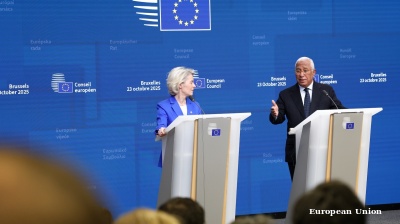The Bavarian branch of far-right AfD party calls for all Ukrainian refugees to be expelled from Germany

The Bavarian branch of Germany’s Alternative for Germany (AfD) party proposed deporting all 1.2mn Ukrainian war refugees living in Germany, claiming there is “room enough” in Ukraine to accommodate them if they could return, the Frankfurter Rundschau (FR) reported on January 17.
The controversial call was made by parliamentary group leader Kathrin Ebner-Steiner following a closed meeting on January 16, according to the Süddeutsche Zeitung.
The far-right AfD has been growing in popularity and won a string of regional elections at the end of last year in the former East German regions that remain economically depressed compared to the rest of the country. The party has campaigned on a populist anti-immigration policy that does not just target Ukrainians, but anyone of a non-German background.
At the same time, support for the war in Ukraine has fallen as the country posted two consecutive years in recession in January and a growing number of factories are closing their doors as the economy deindustrialised due to high energy costs, amongst other factors. In 2024 Germany is estimated to have lost some 10% of its heavy industry. A third of these concerns have moved abroad and another third is reportedly thinking of leaving.
Germany will go to the polls on February 23 after the government collapsed last year. Current opinion polls indicate the Christian Democratic Union/Christian Social Union (CDU/CSU) alliance, led by Friedrich Merz, is leading with approximately 30% support. AfD is in second place with 20%, the currently ruling Social Democratic Party (SPD) holds approximately 16%, and the Greens have 14%. As of mid-January 2025, the Free Democratic Party (FDP) is polling at approximately 4% support, which is below the 5% threshold required to secure representation in the Bundestag.
The ruling coalition is currently in chaos as it faces fresh elections. It is split on key issues like support for Ukraine. German Foreign Minister Annalena Baerbock and leaders of the Greens walked out of a government meeting on January 17 in protest at German Chancellor Olaf Scholz’s refusal to sign off on a €3bn support package for Ukraine. A picture of Scholz reaching out to try to catch her as she left the room has gone viral in German and encapsulates the coalition’s crisis.

In theory the CDU could form a coalition government with AfD, but is highly unlikely to do so. CDU leader Friedrich Merz, widely expected to be the new chancellor, has ruled out any collaboration with the AfD.
However, neither the SDP nor the Greens have enough support to form a government with the CDU, but a “Kenya coalition” government (red, green and black) is possible to keep the AfD out of power.
Right-wing extremism researcher Hajo Funke described the Bavarian AfD in November as among the “most severe forms of the AfD,” the FR reports, likening its ideological position to that of the Thuringian branch led by far-right figure Björn Höcke. The Bavarian AfD has sought to frame itself as “the East in the West,” according to Bundestag member Rainer Rothfuß.
The AfD is increasingly being guided by the so-called Der Flügel ("The Wing"), an extreme far-right faction within the party. Der Flügel has been shaping the party's ideological direction, particularly on issues such as immigration, national identity, and opposition to Germany's democratic and constitutional norms.
The AfD is also seen as pro-Russian and wants Germany to halt support for Ukraine. Three state parliament members participated as observers in Russia’s contentious presidential election that saw Russian President Vladimir Putin re-elected last year, which has been widely criticised as not free and fair.
At a December party conference, the Bavarian AfD passed a resolution advocating “millions of remigrations,” including the deportation of Ukrainian refugees. Ebner-Steiner, while avoiding specifics, called for residence permits to be revoked for the 230,000 people in Germany currently required to leave, according to figures from the Federal Ministry of the Interior. This could extend to denaturalising German passport holders with migration backgrounds in cases of “serious crimes,” a proposal widely criticised by constitutional experts as discriminatory and likely in violation of Germany’s Basic Law.
While the AfD’s latest demand could affect 200,000 refugees in Bavaria and 1.2mn nationwide, its measures are unlikely to be enacted due to the party’s political isolation.
The AfD has highlighted a growing schism in German politics over the issue of migration as other parties such as the CDU are shifting to the right and echo calls for stricter deportation policies in cases of criminal activity.
News

Bill Gates makes surprise Indian TV debut
In a move set to spark both intrigue and curiosity, Microsoft co-founder and philanthropist Bill Gates has made a cameo appearance on Indian television, entering the iconic drama series Kyunki Saas Bhi Kabhi Bahu Thi 2.

Queen Sirikit of Thailand dies
The death of Queen Sirikit of Thailand has marked the end of an era for the Thai monarchy. According to an official statement from the Bureau of the Royal Household of Thailand, Her Majesty died at 9.21 pm on October 24.

Pakistan, the latest in Asia to see gold prices plummet
In international trading, the precious metal lost $35 per ounce to settle around $4,115, extending a week-long slide triggered by shifting expectations over US monetary policy.
_1761305900.jpg)
Latin America edges up growth forecasts but remains trapped in low gear, ECLAC says
Latin America and the Caribbean will expand 2.4% this year, the Economic Commission for Latin America and the Caribbean said, marking the second upward revision since April but pointing to the region's struggle to escape chronically weak growth.



